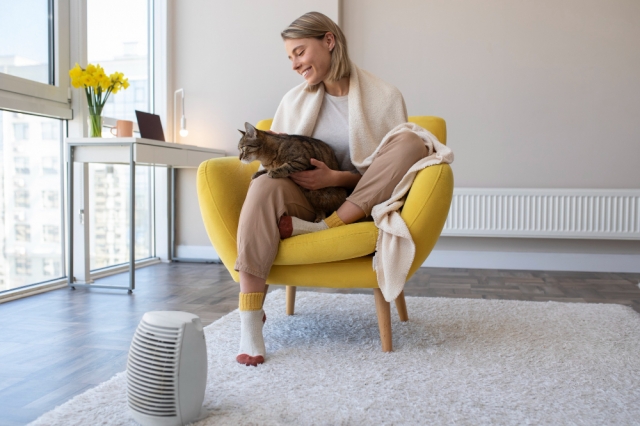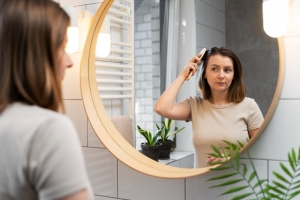Did you know that indoor air can be up to five times more polluted than outdoor air? With allergens like pollen, pet dander, mold spores, and dust mites floating around, it's no wonder so many people struggle with sneezing, itchy eyes, and even asthma attacks right inside their own homes. But what if there were a simple, effective way to change that? Enter the world of air purifiers for allergens—a game changer for anyone looking to breathe cleaner air for better health. In this article, we'll explore how air purifiers work, the benefits of using one, and practical tips to make the most of these powerful devices. Say goodbye to allergens and hello to a healthier home environment!
How Air Purifiers Work to Reduce Indoor Allergies
To understand how air purifiers can transform your wellbeing, it's crucial to know how they work. Air purifiers are devices designed to filter and trap harmful particles from the air, making it cleaner and safer to breathe. The most effective air purifiers for allergens use High-Efficiency Particulate Air (HEPA) filters, which can capture 99.97% of particles as small as 0.3 microns. These filters are the gold standard in allergen removal, trapping tiny particles like pollen, mold spores, and pet dander that can trigger allergic reactions.
Benefits of Using Air Purifiers for Allergens
The advantages of using an air purifier go far beyond just reducing sneezing and watery eyes. Here's a breakdown of the key benefits:
1. Cleaner Air for Better Health
Allergens don't just make you uncomfortable—they can impact your long-term health. Chronic exposure to indoor allergens has been linked to respiratory issues, including asthma and bronchitis. By reducing indoor allergens, air purifiers help protect your lungs and overall wellbeing. Even if you don't suffer from allergies, cleaner air can improve your quality of life by reducing fatigue and boosting your immune system.
Actionable Tip: Place air purifiers in high-traffic areas, like the living room or bedroom, for maximum coverage and health benefits.
2. Better Sleep Quality
Struggling to get a good night's sleep? Allergens could be the culprit. An air purifier can filter out particles that cause sneezing, coughing, or sinus congestion at night, allowing for more restful and uninterrupted sleep.
Example: People who suffer from nighttime asthma or allergies often notice a significant improvement in their symptoms after using an air purifier in their bedroom.
3. Odor Elimination
Air purifiers do more than just remove allergens; they also tackle odors from cooking, pets, or smoke. Activated carbon filters are particularly effective at absorbing smells and keeping your home smelling fresh. This dual action of trapping allergens and eliminating odors creates a more inviting home environment for you and your guests.
Types of Air Purifiers for Specific Allergens
Not all air purifiers are created equal, and it's essential to choose the right type for your needs. Here's a quick guide:
1. HEPA Filters for Pollen and Dust
These are ideal for homes in high-pollen areas or with a lot of dust. They effectively trap large and small airborne particles, making them a top choice for allergy sufferers.
Actionable Tip: Check the HEPA filter regularly and replace it as needed, usually every 6 to 12 months, to maintain optimal performance.
2. UV Air Purifiers for Mold and Bacteria
If you're dealing with mold spores or bacteria, a UV air purifier can be beneficial. These devices use ultraviolet light to kill or neutralize biological contaminants.
Note: While UV air purifiers are effective, they should be used in conjunction with a HEPA filter for comprehensive allergen removal.
3. Activated Carbon Filters for Odors and VOCs
Homes with strong odors or volatile organic compounds (VOCs) from cleaning products or paint can benefit from purifiers with activated carbon filters. These filters absorb odors and chemical fumes, making the air smell and feel cleaner.
Making the Most of Your Air Purifier
To get the best results from your air purifier, consider the following tips:
- Proper Placement: Position your air purifier in areas where you spend the most time, such as the living room, kitchen, or bedroom. Make sure it has enough space around it for unrestricted airflow.
- Regular Maintenance: Replace filters as recommended by the manufacturer. A clogged filter can reduce efficiency and even recirculate allergens into the air.
- Combining With Other Allergy-Reduction Measures: While air purifiers are effective, they work best when combined with other strategies, like regular dusting, vacuuming with a HEPA-filtered vacuum, and keeping windows closed during high-pollen seasons.
Breathe Easier With Cleaner Air
Air purifiers for allergens are more than just a luxury; they're a vital tool for anyone looking to reduce indoor allergies and promote better health. From eliminating allergens and odors to improving sleep quality, the benefits of investing in a high-quality air purifier are undeniable. As you strive for cleaner air and a healthier living space, consider exploring options from reputable companies like HYLA USA, known for their innovative air-cleaning solutions.
Say goodbye to sneezing fits and hello to the comfort of breathing cleaner, purer air. Your lungs—and your overall wellbeing—will thank you!






